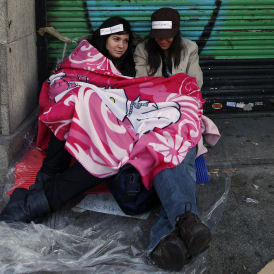Spain’s ‘indignados’ summon spirit of 1968
Thousands of Spanish protesters take part in an illegal demo against mass unemployment as international economist Jan Randolph tells Channel 4 News “Spain is the biggest weakest link in the eurozone”.
Spanish protesters occupied Madrid’s main square in defiance of a ban on public demonstrations in the run up to the country’s local elections.
Some 25,000 mostly young people remain camped out in Puerta del Sol for a seventh day of demonstrations against unemployment and austerity measures.
Spain’s electoral commission had ordered the protesters – dubbed “los indignados” or “the indignant” – to leave ahead of the elections on Sunday. Protesters have gathered in Barcelona, Valencia, Sevilla, Bilbao and other cities.
A law prohibiting political events on the eve of elections came into effect at midnight on Friday and has been upheld by the country’s supreme and constitutional courts. But the massive crowd signalled their defiance as clocks struck 12, by raising their hands and standing in a silent protest.
Spain is the biggest weak link within the eurozone, it’s twice as big as Ireland, Greece and Portugal put together. Jan Randolph
International cconomist Jan Randolph told Channel 4 News: “Well the prospects for the short-term are awful.
“There’s very little opportunity to find work, the pulbic sector is cutting back and the private sector is not hiring.
“So really Spanish youth are going to have to start looking abroad.”
He added: “Spain is the biggest weak link within the eurozone, it’s twice as big as Ireland, Greece and Portugal put together.”
Spain‘s ruling Socialist party have moved to quell fears of a crackdown by announcing that the police would not enforce the ban by trying to arrest protesters or move them from the square.

Prime Minister Jose Luis Rodriguez Zapatero, whose Government has failed to stop unemployment rising to 21.3 per cent – the highest in the European Union at 21.3 percent – said he respected the protesters.
They have called on people not to vote on for either of the two main parties, the Socialists or the centre-right opposition Popular Party, when they go to the pools to elect 8,116 city councils and 13 out of 17 regional governments on Sunday.
Spain pulled out of recession at the start of last year, but the economy has failed to gain momentum and unemployment has spiralled higher, reaching 45 per cent among young people.
One young protester said: “I feel a little bit like everyone, surprised that people finally have risen up and mobilized to defend their beliefs and express themselves. And at the same time I’m very excited that this might get bigger and move on a little bit.”
Inma Moreno, 25, said: “I’m protesting because I’ve got no job future in Spain even though I’ve finished my degree in tourism. This should make the political classes aware that something is not right.”
Javier Gutierrez said: “I saw the protests in May ’68 and this is a similar movement of the youth that had to come out on the streets.”